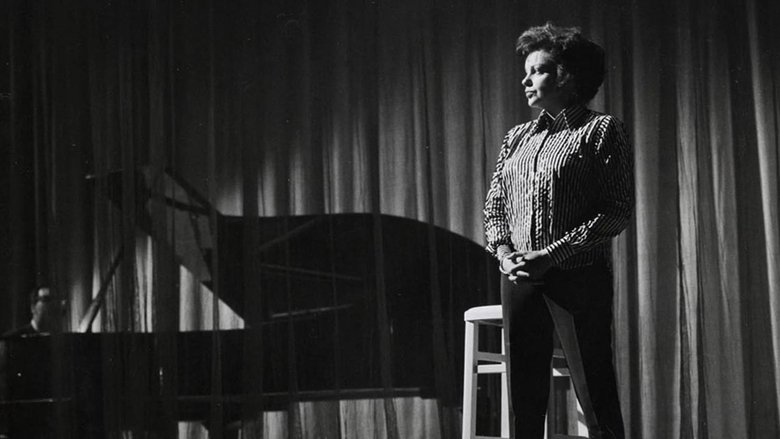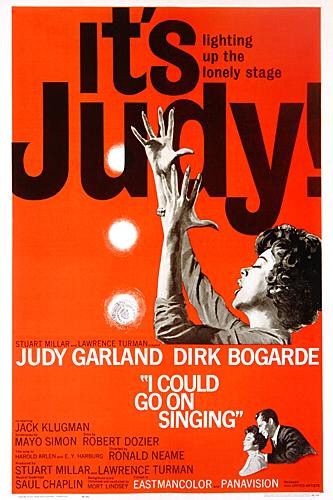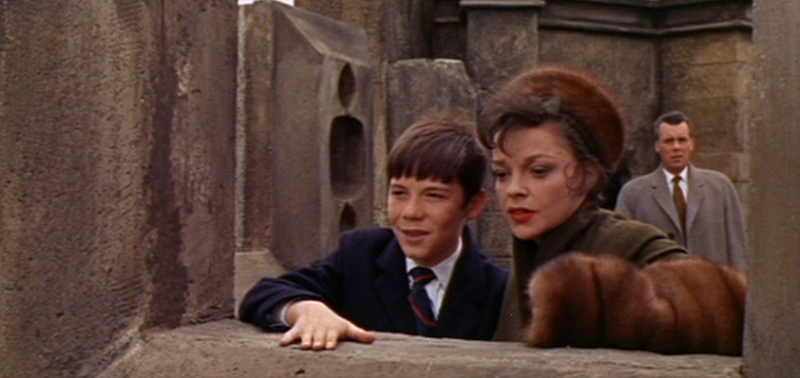← Back to Reviews

in
I COULD GO ON SINGING

The 1963 film I Could Go On Singing has a footnote in cinema history as the final theatrical film of the iconic Judy Garland. Not a great film, but perhaps the one film that offers the closest thing on film I have ever seen to the real Judy Garland and something true fans of the artist should experience since a mere six years later, she was found dead in her London apartment.

Garland plays Jenny Bowman, a famous singer who has been booked for an engagement at the London Palladium and uses this as an opportunity to reconnect with her son, Matt (Gregory Phillips) who lives with his father, Dr. David Donne (Dirk Bogarde), who had an affair with Jenny many years ago that produced Matt. Apparently, David was severely burned by what happened between him and Jenny, who chose her career over him and her son (she and David never married) because he has kept Matt from Jenny and made her swear to never tell him that she is his real mother, but when David weakens and agrees to let Jenny see him, the emotional flood gates have opened and Jenny wants a life with her son.

This film touches on a lot of familiar movie themes, such as what people in show business give up in order to scratch their way to the top, the time a career can take away from being with family, and the pressure that fame often heaps on a celebrity to always be "on," but said themes take on an added richness here because it is Garland who is playing them and anyone knows anything about the actress knows these are things that probably hit close to home for Garland and motivated her to do the film.
Garland loved her children Liza, Lorna, and Joey ferociously and regretted every minute her career took her away from them and you can see that in every move that Jenny Bowman makes...Judy never gave up her children like Jenny did, but her career often took priority and near the end of her career, Garland actually took her kids on tour with her and often had them onstage with her. Garland understood this character and how being reunited with the child she gave up so long ago was now the biggest mistake she ever made in her life.

The film does have its problems...Mayo Simon's screenplay makes Dr. David seem like a heartless monster who has been permanently damaged by his relationship with Jenny and is now punishing her by keeping her away from her son. Dirk Bogarde also has no chemistry with Garland and makes you wonder what Jenny saw in the guy in the first place. I have to admit though I loved the opening scenes where Jenny and David reunite for the first time and David tries to keep it strictly business and Jenny wants to talk about them...well written and acted. There is also a brilliant scene after a night of partying, Jenny is refusing to go on to a sold-out house and David is trying to get her go on...Garland is startling in this scene and reveals the closest thing I have ever seen onscreen to the real Judy Garland.
Director Ronald Neame did understand one thing though and that's the fact that anything wrong with a Judy Garland film becomes irrelevant when she starts singing and the film does come alive in the too-few musical sequences with "Hello Blackbird", "By Myself", and the title tune finale as highlights...Neame doesn't employ a lot of cinema trickery here either...he just points the camera at Garland and lets her do what she does best...the image of Garland in that fire engine red dress alone behind a fire engine red backdrop belting out "By Myself" is one I won't be forgetting anytime soon. For those who want to see a legendary artist near the end of her career but nowhere near the end of her power as a performer, this film is a must.

The 1963 film I Could Go On Singing has a footnote in cinema history as the final theatrical film of the iconic Judy Garland. Not a great film, but perhaps the one film that offers the closest thing on film I have ever seen to the real Judy Garland and something true fans of the artist should experience since a mere six years later, she was found dead in her London apartment.

Garland plays Jenny Bowman, a famous singer who has been booked for an engagement at the London Palladium and uses this as an opportunity to reconnect with her son, Matt (Gregory Phillips) who lives with his father, Dr. David Donne (Dirk Bogarde), who had an affair with Jenny many years ago that produced Matt. Apparently, David was severely burned by what happened between him and Jenny, who chose her career over him and her son (she and David never married) because he has kept Matt from Jenny and made her swear to never tell him that she is his real mother, but when David weakens and agrees to let Jenny see him, the emotional flood gates have opened and Jenny wants a life with her son.

This film touches on a lot of familiar movie themes, such as what people in show business give up in order to scratch their way to the top, the time a career can take away from being with family, and the pressure that fame often heaps on a celebrity to always be "on," but said themes take on an added richness here because it is Garland who is playing them and anyone knows anything about the actress knows these are things that probably hit close to home for Garland and motivated her to do the film.
Garland loved her children Liza, Lorna, and Joey ferociously and regretted every minute her career took her away from them and you can see that in every move that Jenny Bowman makes...Judy never gave up her children like Jenny did, but her career often took priority and near the end of her career, Garland actually took her kids on tour with her and often had them onstage with her. Garland understood this character and how being reunited with the child she gave up so long ago was now the biggest mistake she ever made in her life.

The film does have its problems...Mayo Simon's screenplay makes Dr. David seem like a heartless monster who has been permanently damaged by his relationship with Jenny and is now punishing her by keeping her away from her son. Dirk Bogarde also has no chemistry with Garland and makes you wonder what Jenny saw in the guy in the first place. I have to admit though I loved the opening scenes where Jenny and David reunite for the first time and David tries to keep it strictly business and Jenny wants to talk about them...well written and acted. There is also a brilliant scene after a night of partying, Jenny is refusing to go on to a sold-out house and David is trying to get her go on...Garland is startling in this scene and reveals the closest thing I have ever seen onscreen to the real Judy Garland.
Director Ronald Neame did understand one thing though and that's the fact that anything wrong with a Judy Garland film becomes irrelevant when she starts singing and the film does come alive in the too-few musical sequences with "Hello Blackbird", "By Myself", and the title tune finale as highlights...Neame doesn't employ a lot of cinema trickery here either...he just points the camera at Garland and lets her do what she does best...the image of Garland in that fire engine red dress alone behind a fire engine red backdrop belting out "By Myself" is one I won't be forgetting anytime soon. For those who want to see a legendary artist near the end of her career but nowhere near the end of her power as a performer, this film is a must.
